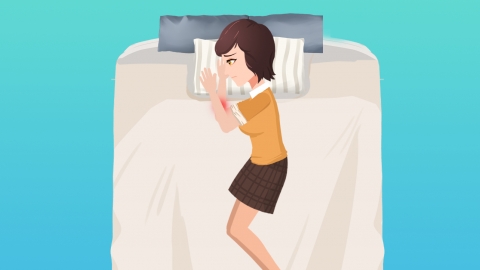What causes numbness on the back of the hand during sleep?
Generally, hand numbness during sleep may be caused by improper sleeping posture, prolonged repetitive hand movements, carpal tunnel syndrome, multiple sclerosis, cervical spondylosis, and other factors. Symptomatic management such as general treatment and medication may be needed. If symptoms are severe, timely medical consultation and following medical advice for treatment are recommended. Detailed analysis is as follows:

1. Improper Sleeping Posture
During sleep, maintaining the same posture for a prolonged period, especially when compressing the hand or arm, may affect local blood circulation and cause numbness in the back of the hand. Usually, no other symptoms are present, and symptoms can be quickly relieved by changing posture. It is recommended to perform appropriate hand exercises to promote blood circulation and alleviate the numbness.
2. Prolonged Repetitive Hand Movements
Engaging in extensive hand activities during the day, such as typing or playing musical instruments, can lead to hand muscle fatigue and tension, which may compress nerves, especially the ulnar and median nerves, causing hand numbness during sleep. Symptoms such as reduced hand strength and decreased finger flexibility may also occur. It is recommended to take regular breaks and perform hand massages, which can help alleviate hand numbness during sleep.
3. Carpal Tunnel Syndrome
Carpal tunnel syndrome is a nerve compression disorder caused by pressure on the median nerve within the wrist's carpal tunnel, which obstructs nerve conduction. During sleep, blood flow slows down, and wrist volume increases, further exacerbating nerve compression, leading to numbness in the back of the hand. Symptoms such as wrist pain and weakness may also be present. It is recommended to take anti-inflammatory and pain-relieving medications such as ibuprofen sustained-release capsules, diclofenac sodium sustained-release tablets, and celecoxib capsules under medical guidance.
4. Multiple Sclerosis
Multiple sclerosis is primarily caused by the combined effects of autoimmune responses, viral infections, and other factors. In multiple sclerosis, the myelin sheath of the central nervous system is damaged, affecting nerve signal transmission and causing sensory abnormalities. Hand numbness during sleep may also occur, possibly accompanied by symptoms such as blurred vision, limb weakness, and balance disorders. It is recommended to use medications such as glatiramer acetate injection, dimethyl fumarate enteric-coated capsules, and teriflunomide tablets under medical guidance for treatment.
5. Cervical Spondylosis
Poor sitting posture over a long period or constantly looking down at electronic devices may trigger cervical spondylosis. Protruding cervical intervertebral discs or bone overgrowths may compress the nerve roots that control the hands, causing hand numbness during sleep. Symptoms such as neck pain, stiffness, and dizziness may also be present. It is recommended to follow medical advice and take neurotrophic medications such as mecobalamin tablets, oryzanol tablets, and vitamin B1 tablets for symptom relief.
It is recommended to perform simple hand exercises before sleep and after waking up, such as stretching hand muscles and joints, which can help promote blood circulation.





